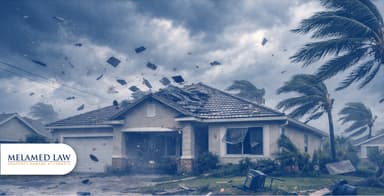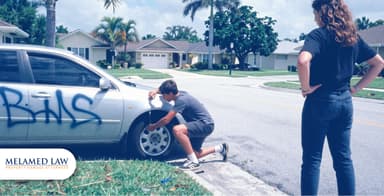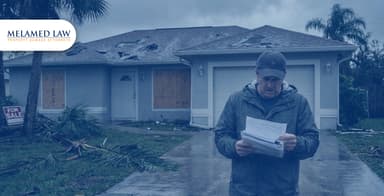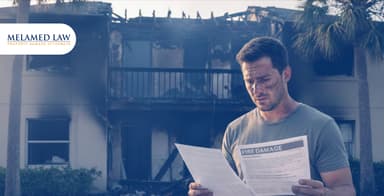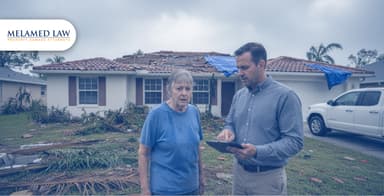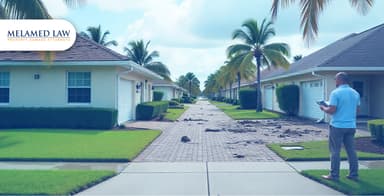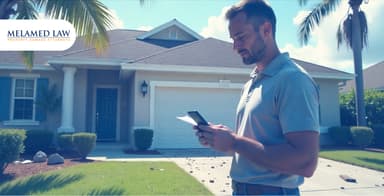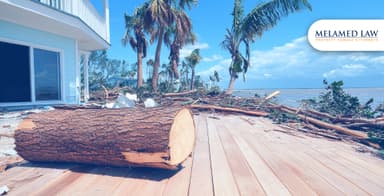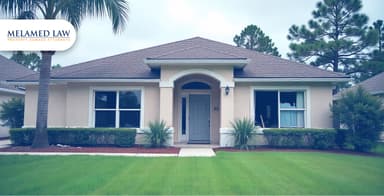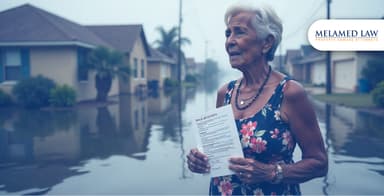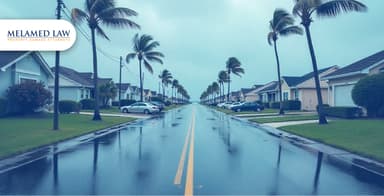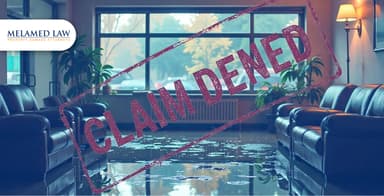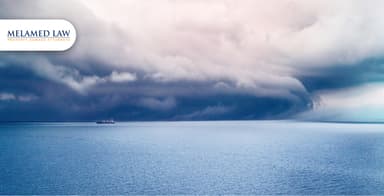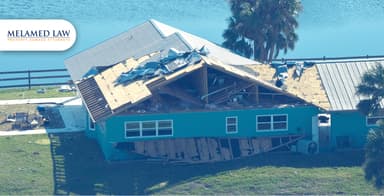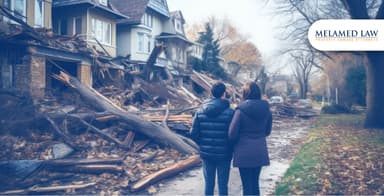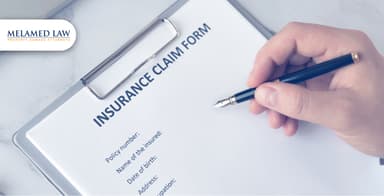
How to Handle Storm Damage Insurance Claims for Businesses in Florida
When the unexpected happens, we help individuals and businesses collect the money they deserve for their insurance claims.
Melamed Blogs
July 28, 2025
How to Handle Storm Damage Insurance Claims for Businesses in Florida
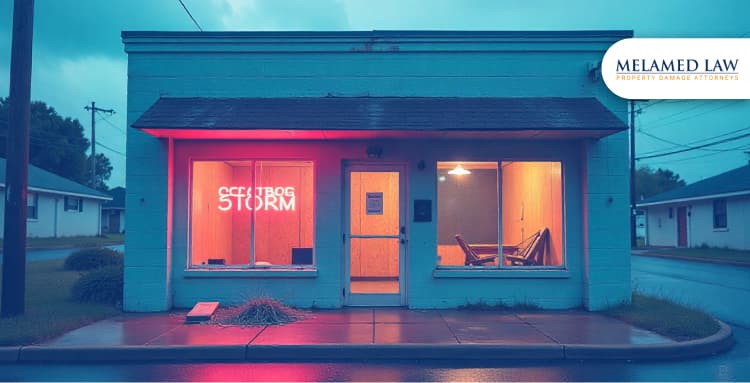
When Florida businesses get hit by a hurricane or tropical storm, the physical damage is only the beginning. If you are not prepared, the next step, filing a storm damage insurance claim, can be even more devastating. Did you know more than 43% of commercial property insurance claims in Florida were denied, left unpaid, or unresolved after Hurricane Ian?
Insurance policies are incredibly complex, and the deadlines are short. Far too often, claims are denied or delayed for reasons buried deep in ambiguous policy language. In the meantime, your business may be shut down, employees left waiting, and your income frozen.
You don’t have to become just another vanishing statistic. Let us walk you through the steps to filing a strong storm damage claim, what to look out for, and how legal representation can have a major influence on the outcome.
1) Florida’s Storm Season by the Numbers: Why Businesses Are Always at Risk
Florida's geographical position is highly prone to tropical storms and hurricanes. It's important for business owners to be aware of and manage their insurance coverage to mitigate potential losses.
The Atlantic hurricane season averages 14 named storms, 7 hurricanes, and 3 major hurricanes (Category 3 or higher) each year.
Source: National Oceanic and Atmospheric Administration
These storms not only cause havoc for homeowners' property and houses. Besides that, they cause significant economic losses for businesses.
In 2024, Hurricane Milton alone resulted in estimated insured losses ranging from $30 billion to $50 billion, marking it as one of the costliest storms in recent history.
Source: Reuters
These statistics show the frequency and unpredictability of storm-related damages in Florida. Businesses are particularly vulnerable, facing a range of potential damages, including:
Property Damage: Structural harm to buildings and facilities.
Inventory Loss: Destruction of goods and stock due to water intrusion or wind.
Equipment Damage: Malfunction or destruction of machinery and technology.
Income Loss: Interruption of business operations leading to revenue decline.
2) Why Insurance Claims Get Denied or Delayed (And Why That’s Not Fair)

Despite paying premiums responsibly, many business owners find themselves trapped within the confines of complicated policies, underpaid settlements, and late response times from the insurance company.
Complex language in policies
Insurance policies are often designed with complicated, technical terms. Conditions that can be challenging to interpret. This complexity can lead to misunderstandings about coverage, resulting in denied claims. For instance, certain damages may be excluded under specific clauses, leaving homeowners unaware until a claim is filed.
Underpaid claim payments
Even when claims are approved, insurers may offer settlements that fall short of covering the actual damages. This practice leaves businesses struggling to fund necessary repairs and resume operations.
Slow Response Times from Insurers
After a storm, you need communication at the right time. However, insurance companies often delay responses, prolonging the claims process and exacerbating the financial burden on businesses. These delays can disrupt recovery efforts and increase the risk of further damage.
3) How Melamed Law Helps Florida Businesses Reclaim Their Dues
We recognize the complexities Florida businesses encounter when handling storm-related insurance claims. At Melamed Law, we take on the legal burden so business owners don’t have to, working to secure the full compensation they're entitled to under their policy. Here's how we assist:
Complete Policy Review Before Filing
Before initiating a claim, we thoroughly examine your insurance policy to identify coverage specifics, exclusions, and potential pitfalls. This proactive step ensures that your claim is structured effectively from the start, minimizing the risk of disputes or denials.
Managing All Communications with Insurers
Insurance companies often employ tactics that can complicate the claims process. We take over all communications with your insurance company, ensuring that your rights are protected and that no statements are made that could jeopardize your claim. Our experience enables us to navigate these interactions strategically, aiming for a favorable outcome.
Pursuing Full Compensation Through Negotiation or Litigation
Our goal is to secure the maximum compensation for your losses. We begin with assertive negotiations, leveraging our knowledge of insurance law and claim valuation. If the insurer fails to offer a fair settlement, we're prepared to escalate the matter to litigation, advocating fiercely on your behalf.
4) What Business Owners Often Miss

When a storm tears through your community, you’re not thinking about policy clauses. You’re thinking about protecting your employees, salvaging inventory, and finding a way to reopen your doors. And yet, some clauses buried in your insurance policy could severely limit your recovery unless you catch them early and respond properly.
We’ve seen firsthand how even responsible, detail-oriented business owners can get blindsided by technicalities. They didn’t make a mistake. They just weren’t warned about the risks buried in their policy.
The Hidden Clause That Can Cancel Everything
One of the most dangerous clauses we see is something called an anti-concurrent causation (ACC) clause. It sounds harmless until your claim is denied.
Let’s say wind damaged your roof (a covered event), but rising floodwaters also ruined your equipment (an excluded peril). If your policy contains an ACC clause, the insurance company might reject the entire claim, even the wind damage.
“For policies with anti-concurrent causation language, insurers may deny coverage if any excluded peril plays a role in the loss, even if a covered peril also contributed.”
Source: Insurance Journal
Deadlines You Didn’t Know You Had
Another common trap is the proof of loss deadline. In Florida, many policies require you to submit detailed documentation, sometimes within a fixed days of the storm. Miss it, and your claim might be tossed out, no matter how legitimate it is.
It’s not fair. And frankly, it’s not right that these clauses and deadlines are hidden in confusing language when you're just trying to recover.
You Deserve a Team That Reads the Fine Print for You
We don’t expect you to be an insurance expert. You’ve already got enough on your plate. Our job is to comb through every word of your policy, flag every risk, and make sure no deadline or hidden clause stands between you and the recovery you’ve worked so hard for.
We’ve helped countless Florida business owners who felt overwhelmed, exhausted, and cornered by their insurers. We stood beside them—reading between the lines, filing the right documents, and fighting for what was right.
If you’re feeling unsure about your claim or your policy, don’t wait until it’s too late. Let Melamed Law handle the details, so you can focus on what matters most. Rebuilding your business operations and moving forward.
5) Fast Action, Bigger Recovery: The Timeline That Can Decide the Fate of a Lawsuit
When a hurricane hits, Florida business owners rightly focus first on employee safety and assessing the damage. However, with everything going on, it’s critical not to lose sight of the strict deadlines that apply to insurance claims.
Understanding Florida's Claim Deadlines
Florida law requires policyholders to notify their insurance company of a hurricane-related claim within a set time frame from the date the hurricane made landfall. Additionally, if you discover further damage after your initial claim, you have a fixed timeframe from the date of loss to file a supplemental claim.
The Consequences of Delay
Failing to meet these deadlines can result in your claim being denied, leaving your business without the necessary funds to rebuild. Insurance companies may also argue that delays in reporting contributed to the extent of the damage, further complicating your claim.
How Melamed Law Speeds Up the Process
We understand the urgency of these situations. Our team acts swiftly to:
Promptly Notify Insurers: We ensure that your claim is filed within the required timeframe, preserving your rights.
Comprehensive Documentation: We assist in gathering all necessary evidence to support your claim, reducing the likelihood of disputes.
Efficient Communication: We handle all interactions with your insurance company, preventing common delays and misunderstandings.
If your business has suffered storm damage, don't wait. Reach out to Melamed Law today to ensure your claim is filed timely and effectively.
6) It’s Not Just a Claim, It’s Your Business’s Future
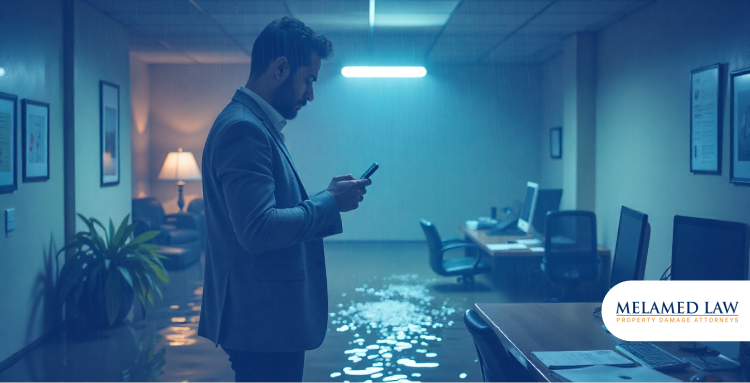
An insurance claim is more than just a formality; it represents the livelihood you’ve built, the employees you support, and years of dedication. A storm can have serious consequences for your business. Small businesses make up over 99% of companies in Florida and employ nearly half of the state’s workforce.
“Florida small businesses employed 3.3 million people, or 49.6% of the private workforce, in 2015.”
Source: Office of Advocacy, 2018 Small Business Profiles
Delays or denials in insurance claims can threaten not only your finances but also the security of your employees and community.
Melamed Law: Protecting Florida Companies Beyond the Loss
In Florida, storms may be a part of life, but their consequences don’t have to rewrite your story. We know the true cost of a disaster isn’t just measured in broken windows or damaged roofs. It’s in the sleepless nights, the payroll you still need to meet, and the years you spent building something from the ground up.
We stand beside you when the winds die down and the real work begins. We offer a free case review to evaluate your claim and help you understand your options. Our promise is to fight for what’s rightfully yours to shield your business from delay and denial.
When you're ready, Melamed Law is here. Contact us today by phone or via email. Quick action following a storm can make sure that everything is okay.
Recent Cases


